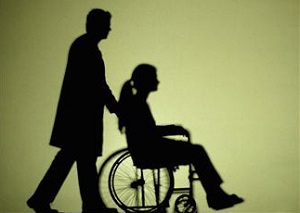
There are many parallels between living with a disability and dealing with an uninvited house guest. If you have ever had an uninvited house guest, I am sure you remember moments when things may have been uncertain and, at times, tense or uncomfortable. At the very least, having an uninvited guest requires some adjustments, much like living with a disability.
An uninvited guest may arrive unannounced, leaving no time to plan or prepare. Likewise, in many cases people living with disability have little or no time to plan for the many changes to come. While there may have been no way to prevent the disability and requisite life changes, having time to prepare—psychologically and literally—can make a huge difference in a person’s ability to adapt and cope.
A period of psychological adjustment is required for a person who has a disability, his or her spouse/partner, parents, and other family members. The adjustment process people frequently talk about resembles the grief process in many ways. Like the grief process, people often experience feelings in what seem to be stages. Similar to the grief process, this adaptation process usually begins with a period of denial.
Denial
In my work with couples and families living with multiple sclerosis, I often hear concerns that one person seems to be “stuck in denial.” To people who have moved through the initial denial stage, it may seem as if their loved one is not progressing as quickly as others. The truth is, different people work through this period of adjustment differently, and it takes as long as it takes. The denial stage usually happens at the time of diagnosis or disability, and may come up again at other times. For example, in a progressive illness, if one begins to lose mobility or other limitations arise, the initial stage of the adjustment process may be triggered again.
It may seem clear to a caregiver/partner or family member who has been helping someone walk even short distances that a mobility device is needed (cane, walker, scooter). For the person who is having mobility difficulty, admitting that it is time to talk to a doctor about a mobility device may affect his or her identity, hope for recovery, or future progress. If so, working through the denial and bargaining, and then later stages of adaptation, may be necessary. It is not unusual to see all members of the family triggered by new developments that start the process over.
Denial is believed to be a protective measure that prevents us from becoming emotionally overwhelmed. Denial slows down the process of coping with traumatic events, giving us more time to psychologically prepare ourselves for the onslaught of feelings. The process of denial, known as a defense mechanism, should not be rushed or sabotaged by well-meaning loved ones who are at a different place in the adaptation process. Doing so can cause the person who needs more time to become emotionally overwhelmed without the necessary skills to cope effectively.
Coping skills: A person with disability and his or her family members should try to be empathetic and understand things from the perspective of others. Be honest, but gentle, about your perceptions. Choose the time to discuss these issues carefully—not when either of you are tired, frustrated, or angry. Always talk to your loved one(s) before bringing up concerns with doctors or other professionals. Caregivers and family members should keep in mind that their needs are important, too. Take care of yourself and make sure you have plenty of support. When children are involved, be very careful what and how you share information with them. Children need to hear things based on what is appropriate for their age and stage of development. Ask for guidance from a professional if you are unsure how much to tell children or how to talk to them about disability.
Bargaining
The stage that usually follows denial is bargaining. During this time, people often are looking for second opinions, alternative therapies, and other remedies. It can also be a time when we promise the gods that we will turn our lives around if given a second chance without the disability or diagnosis.
It is true that finding the best medical providers, keeping a positive outlook, and staying informed of new research and possibilities is important. However, this can also be a time when people are vulnerable to scams and false promises. Unfortunately, there are a lot of companies and people who offer products and services that guarantee outcomes without doing the necessary research required to back up those assurances.
It is a good idea to check out any new or experimental treatments carefully before trying them—particularly if there is a large commitment of money, resources, or time involved. Check with local and national nonprofit organizations that provide services to people with your specific issue or health challenge. Agencies such as the National MS Society, American Cancer Society, and others often have information about ancillary and alternative therapies. They may be able to send you information or answer your questions.
Coping skills: Make decisions together based on facts. Find local and national organizations that you trust to support you and provide well-researched information. Be sure that any second opinions or ancillary providers have access to all the information you have from other providers. In some cases, taking medications or treatment without being fully aware of how they interact with your other treatment can be life-threatening. Make a commitment to fully investigate any new or experimental treatments before deciding to try it. Ask for and check references when appropriate. Verify the credentials of all providers before visiting them. At some point, you may have to accept a new reality that you had not planned for and do not welcome. If you have prolonged difficulty coping with the diagnosis or prognosis, find support from a professional or support group to help you with the transition.
Over the next few months, I will explore additional aspects of disability, how it affects the lives and relationships of the people involved, and ways of coping with these situations. If you have ideas to share about how you have effectively coped with any of the situations presented, please join the discussion by leaving comments below. Likewise, if you have questions, feel free to ask for input from others who read the blog.

The preceding article was solely written by the author named above. Any views and opinions expressed are not necessarily shared by GoodTherapy.org. Questions or concerns about the preceding article can be directed to the author or posted as a comment below.


 Disability Awareness: a Process, Not an Event
Disability Awareness: a Process, Not an Event What Does It Mean to Be a Special Needs Parent?
What Does It Mean to Be a Special Needs Parent? The Art of Comforting: How to Help
The Art of Comforting: How to Help

Please fill out all required fields to submit your message.
Invalid Email Address.
Please confirm that you are human.
Leave a Comment
By commenting you acknowledge acceptance of GoodTherapy.org's Terms and Conditions of Use.